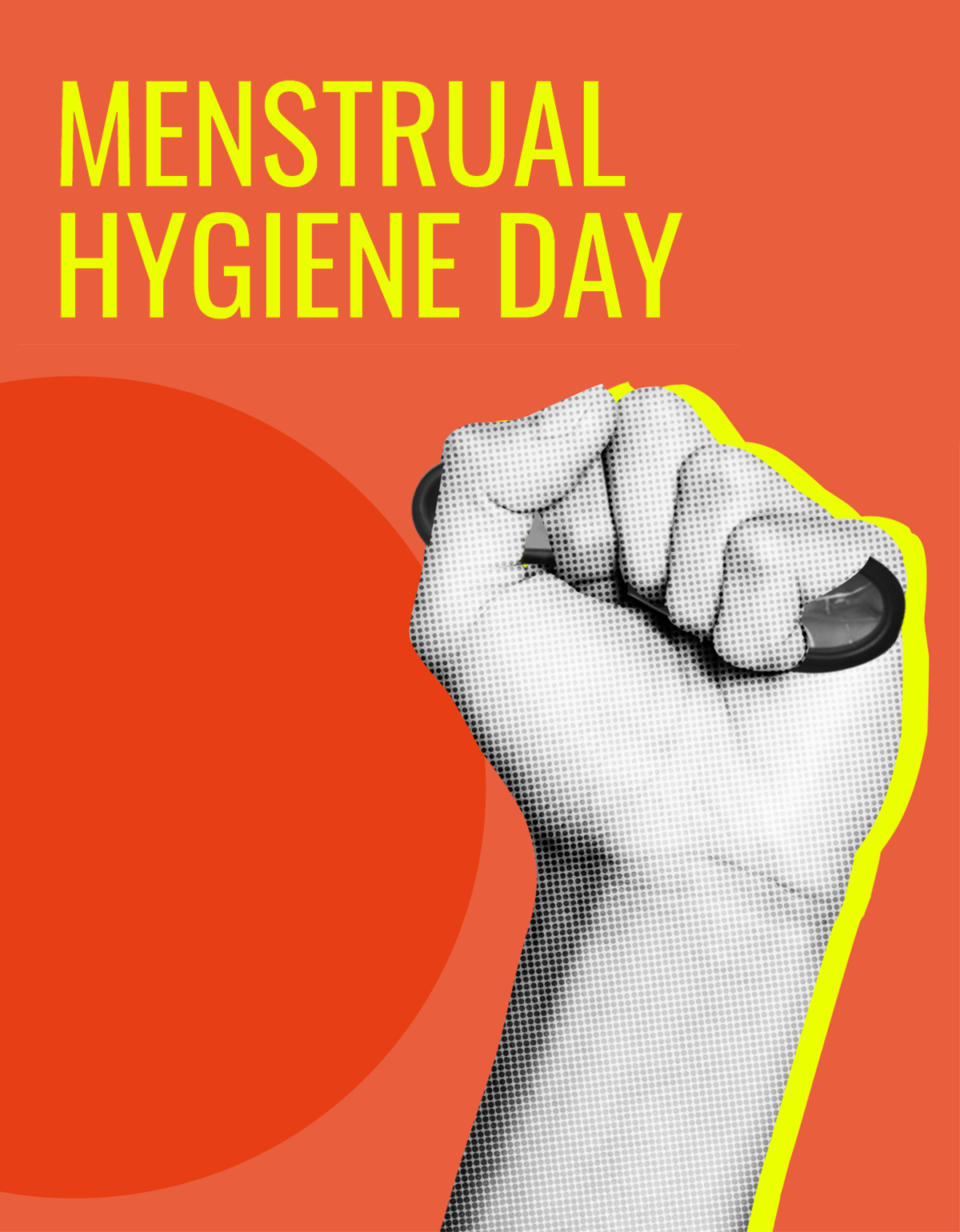Periods are so taboo that we have countless expressions to hide their occurrence, ensuring that we never let the word “menstruation” echo from our lips. We speak in code or avoid acknowledging menstruation altogether. What effects does the way we communicate about periods have on menstruators and menstrual stigma?
We wanted to explore why we use euphemisms, where they come from, and how they perpetuate menstrual stigma and shame.
A running list of period euphemisms
- Shark week
- Time of the month
- Aunt Flo
- On the rag
- Crimson tide
- Moon cycle
- Mother nature’s gift
- Code red
- Girl flu
- The curse
- The dot
- Riding the cotton pony
Can you think of others? A survey conducted by Clue and The International Women’s Health Coalition found 5,000 slang terms and euphemisms for periods. 1 You can also browse an exhaustive list of euphemisms employed around the world at The Museum of Menstruation and Women’s Health website.
The survey also found that, in certain countries, euphemisms are the dominant way people communicate about periods. Countries like France and China spoke about periods by using 90% slang. The study found euphemisms in 10 different languages.
It’s a widely accepted part of our vernacular to use euphemisms when speaking about periods, largely thanks to menstrual stigma and sexism.
At Flex (brace yourself), we say the word ‘period’ because we want to instill in our community that periods are nothing to hide or be ashamed of.
The (unsurprising) history of period euphemisms
Menstruation is a basic biological function that half of the population experiences, so why have others in the past been so reluctant to call it what it is?
We took a look through the ages to see if we could pinpoint how certain euphemisms for menstruation came about and, well, the results are predictable (to say the least).
In a chapter of Palgrave Handbook of Critical Menstruation Studies, entitled “Menstrual Taboos: Moving Beyond the Curse,” author Alma Gottlieb traces euphemisms and taboo back to the Hebrew Bible (or the Old Testament). 2
In Leviticus, a list of rules outlines the activities one is forbidden to do during menstruation. Here’s an excerpt:
When a woman has her regular flow of blood, the impurity of her monthly period will last seven days, and anyone who touches her will be unclean till evening.
Anything she lies on during her period will be unclean, and anything she sits on will be unclean.
Whoever touches her bed must wash his clothes and bathe with water, and he will be unclean till evening.
Whoever touches anything she sits on must wash his clothes and bathe with water, and he will be unclean till evening.
Leviticus 15:19-22
The euphemism of the word “curse” might stem directly from this text. In a study, Gottlieb found that 50 percent of menstruators in Oregon referred to their periods as “the curse.”
Gottlieb notes, “many biblical commentators throughout history have viewed the Levitical menstrual prohibitions as divine punishment for the sinful nature of woman, which, through the actions of Eve, effected the fall of humankind. Menstruation becomes the divine ‘curse’ of women.” 2
While some might connote the word curse for menstruation to mean ‘I am cursed with cramps, bloating, fatigue, etc.’ (which, admittedly, is not fun for anyone), the long-standing practice of calling or considering menstruation a curse are far more global and disastrous.
As we see in the biblical excerpts above, the word ‘curse’ not only extends to the menstruator but to anyone who might come close to the process. It’s no surprise “the curse” stems from patriarchal ideology.
Other euphemisms like “my time” might have internalized the taboo of “the curse” by offering distance between the word and the process of menstruation. Euphemisms act as placeholders to create space between periods and people, which creates the warning label, “stay as far away from the process as humanly possible.”
The distance that euphemisms create speaks to the ways in which the “curse” has become enmeshed in society over generations. Euphemisms are always indirect figures of speech that protect those listening from the reality a given word conjures up. They shield the non-menstruator from having to get near the experience, even if the phrases themselves appear innocent at face value.
How cultural attitudes create euphemisms
As we’ve learned from “the curse,” cultural or religious attitudes toward periods set the stage for euphemisms.
Many religious and cultural institutions (beyond Christianity and Judaism) have carried forth negative or fearful ideas of menstruation: In Bali, for example, caste influences menstrual attitudes. As Gottlieb notes in her book, menstruating women must refrain from entering temples, cooking, having sex, and even touching ‘men’s objects.’ 2
In a journal article titled “The Vernacular of Menstruation,” author Natalie F. Joffe examines the ways in which word choice from specific cultures indicates those cultures’ attitudes toward menstruation—for the most part, independent from religion.
In Germany, she notes, menstruators are regarded as unclean: “Two of the more common vernacular terms are Schweinerei and Siiuerei, both of which stress the filthy aspect of swine.” 3 Similar attitudes, she claims, are held in Polish and Eastern European cultures.
Interestingly, Joffe finds that America is the only country whose euphemisms point to our materialistic culture. Euphemisms such as “on the rag” or “riding the cotton bicycle” are specific to menstrual product use—and product-derived euphemisms are unique to America.
Equally common American euphemisms, employed both by menstruators and non-menstruators, are variations of “female anthropomorphisms, particularly when phrased as relatives coming to visit … Grandma is here, Grandma has left, thank God, little sister’s here, Aunt Jane, my country cousin, I expect a visit from my Aunt Susie, are some of the more typical phrases.” 3
Seem a little outdated, perhaps? Joffe’s article was published in 1948. But it’s striking to note that, while English slang and vernacular have evolved immensely in the past 70+ years, many of our most popular period euphemisms have more or less the same. More recent studies show that we still use “on the rag,” versions of “riding the cotton [blank],” and “Aunt [blank]” on a regular basis. 4
In other countries around the world, period euphemisms frequently allude to color (rather than people or material goods) in their insinuations. The Swedish may say, “Lingonveckan,” which means “lingonberry week.” Similarly, many Germans use the term “Erdbeerwoche,” which means “strawberry week.” 5
And then there are cultures that add a historical twist to their euphemisms: Some French say, “Les Anglais ont debarqué,” which means “the English have landed.” Similarly, French Canadians have been said to use the phrase “Les Allemands sont en ville,” meaning “the Germans are in town.” 5
What’s the harm in euphemisms?
Stigma is what perpetuates euphemisms. As detailed in a different chapter of Palgrave Handbook of Critical Menstruation Studies, entitled “The Menstrual Mark: Menstruation as Social Stigma,” authors Ingrid Johnston-Robledo and Joan C. Chrisler explain how the inability to communicate about menstruation often leads to the failure to disclose information about reproductive, sexual, and physical health. This has dangerous implications. 6
This inability to communicate effectively is also brought up in Gottlieb’s chapter of the book. She cites a study in Sweden, where only 38% of women who suffered from excessive menstrual bleeding reported their condition to their doctors. 7
A separate study by Plan International UK, carried out in 2018, found that “nearly 80% of adolescent girls have experienced concerning menstrual symptoms (such as unusually heavy or irregular bleeding) but hadn’t consulted a health professional; 27% of those said they were too embarrassed to discuss the topic.” 8
Using adequate and appropriately descriptive language to describe menstruation is a critical step in the process of remedying these issues. Open communication around menstruation brings people into the conversation who we might typically shield it from. By talking about periods the same way we might discuss our skincare routine or our dietary preferences, we can begin to break down the embarrassment, shame, or awkwardness that has been ingrained in many of us since childhood.
On the other hand, continuing to use euphemisms to hide what we’re really going through—and failing to bring non-bleeders into the conversation (i.e., cis men)—further perpetuates stigma and contributes to the lack of equitable funding, education, and resources distributed to those with periods.
Silence is violence
“Words tell a story. So do efforts to avoid words. The discursive act of substituting euphemisms for certain words brings us straight to the territory of taboo,” says Gottlieb. 2
We can define stigma as a negative attitude based on a characteristic; in this case, the characteristic is menstruation.
Menstruators are taught to be silent about their periods, and if it’s not silence, it’s code. Silence exacerbates stigma. Menstruators might internalize the message of silence as embarrassment, self-consciousness, or concealment around their periods leading to failure to communicate, bad body image, or self-hatred.
Menstrual stigma also contributes to menstruators’ perceived lower social status. 6 One 2007 study surveyed college students in Mexico and America around attitudes toward menstruation, and participants from both countries most frequently used the words “moody” and “irritable” to describe menstruating women—whereas pregnant women were associated with the word “happy.” 9
The authors of the study conclude as follows:
“The results indicate that the only way for women to be viewed positively (or, at least, not negatively) is to be pregnant or (especially in Mexico) a new mother. To be menstruating (or about to menstruate) is not to be pregnant. To be menopausal or to have had a hysterectomy means a woman cannot get pregnant. Hence, she is ‘of no further use.’”
Final thoughts: Undoing taboos
Gottlieb declares that the antidote to taboo is saying what you mean to say. “Uttering phrases normally avoided violates taboo” 2
Though taboos typically have roots that have grown for centuries, the good news, Gottlieb points out, is “once challenged systematically, taboos may erode surprisingly quickly.” 2
Acknowledging menstruation rejects taboo. At Flex, we are not afraid to use the words ‘menstruation,’ ‘period,’ or ‘menstrual fluid,’ because that’s exactly what we mean to talk about.
Most likely, we’ve all used euphemisms to refer to our periods at one point or another. Sometimes we speak in code because it doesn’t feel safe to bring up menstruation. Often, however, we use euphemisms habitually.
If you’ve relied on euphemisms in the past when mentioning your period to friends, family, healthcare providers, coworkers, or anyone else—take a moment to consider the weight they hold moving forward. There is nothing shameful, dirty, or unnatural about menstruation. In fact, none of us would be here without it.
Next time the opportunity presents, we challenge you to say, out loud, “I’M ON MY PERIOD” for everyone to hear. It’s pretty liberating. Want to learn other ways to challenge period stigma and join in the fight for menstrual equity? Check out these resources:
- Menstrual Hygiene Day 2021: Leveraging TikTok to end period poverty
- How 16-year-old Tessa Gabriel Meil is fighting for menstrual equity
- Menstrual equity wins: The UK eliminates tampon tax
- Racial disparities in endometriosis diagnosis: A conversation
© 2021 The Flex Company. All Rights Reserved.
- O’Connor, R. (2016, March 1). There are more than 5,000 ways to say ‘period’ around the world – these are the best ones. The Independent. https://www.independent.co.uk/life-style/health-and-families/menstruation-study-finds-over-5-000-slang-terms-period-a6905021.html[↩]
- Bobel, C., Winkler, I. T., Fahs, B., Hasson, K. A., Kissling, E. A., & Roberts, T. (2020). Menstrual Taboos: Moving Beyond the Curse. In The Palgrave Handbook of Critical Menstruation Studies (pp. 144-167). Springer Nature.[↩][↩][↩][↩][↩][↩]
- Joffe, N. F. (1948). The Vernacular of Menstruation. WORD, 4(3), 181-186. https://doi.org/10.1080/00437956.1948.11659341[↩][↩]
- Sveen, H. (2016). Lava or Code Red: A Linguistic Study of Menstrual Expressions in English and Swedish. Women’s Reproductive Health, 3(3), 145-159. https://doi.org/10.1080/23293691.2016.1237712[↩]
- Museum of Menstruation and Women’s Health. (n.d.). Words and expressions for menstruation. https://www.mum.org/words.html[↩][↩]
- Bobel, C., Winkler, I. T., Fahs, B., Hasson, K. A., Kissling, E. A., & Roberts, T. (2020). The Menstrual Mark: Menstruation as Social Stigma. In The Palgrave Handbook of Critical Menstruation Studies (pp. 181-199). Springer Nature.[↩][↩]
- Kadir, R. A., Edlund, M., & Von Mackensen, S. (2010). The impact of menstrual disorders on quality of life in women with inherited bleeding disorders. Haemophilia: The Official Journal of the World Federation of Hemophilia, 16(5), 832–839. https://doi.org/10.1111/j.1365-2516.2010.02269.x[↩]
- Plan International UK. (2021, October 20). Nearly two million girls in the UK miss school because of their period. https://plan-uk.org/media-centre/nearly-two-million-girls-in-the-uk-miss-school-because-of-their-period[↩]
- Marván, L., Islas, M., Vela, L., Chrisler, J. C., & Warren, E. A. (2008). Stereotypes of Women in Different Stages of Their Reproductive Life: Data From Mexico and the United States. Health Care for Women International, 29(7), 673-687. https://doi.org/10.1080/07399330802188982[↩]








